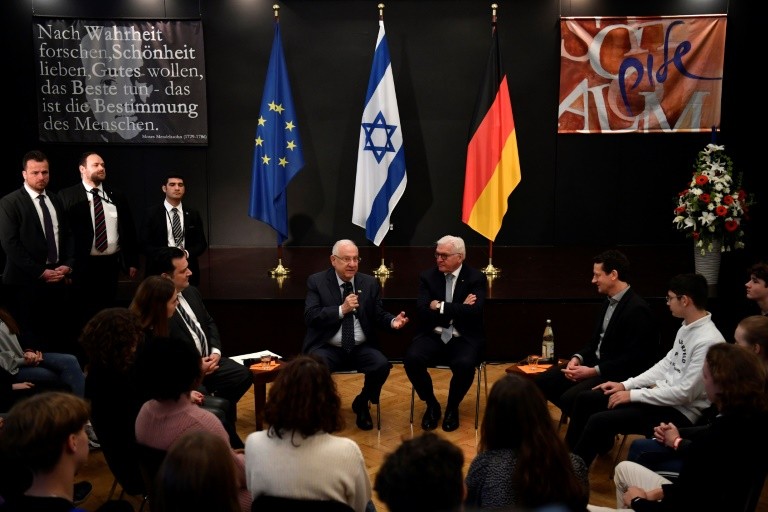Israel’s president will deliver a speech in Berlin on Wednesday to mark 75 years since the liberation of the Auschwitz Nazi death camp, as fears re-emerge about the safety of Jews in Germany.
Reuven Rivlin will be joined by German President Frank-Walter Steinmeier in addressing lawmakers at the glass-domed Bundestag from 1000 GMT.
Both men in recent days have already attended high-profile anniversary events in Jerusalem and at Auschwitz-Birkenau in Poland, where survivors and dignitaries from around the world raised alarm about resurgent anti-Semitism in Europe.
Rivlin will be only the second Israeli leader to address German MPs at Berlin’s annual event to remember the Holocaust, after Shimon Peres in 2010.
This time, the audience will include MPs from the far-right AfD party, whose leaders have openly railed against Germany’s remembrance culture and its ongoing atonement for the atrocities committed under Adolf Hitler’s regime.
– ‘Very negative influence’ –
A decade ago, Peres used his Berlin speech to issue an emotional plea for the world to bring the remaining perpetrators of Nazi crimes to justice.
But faced with a dwindling number of people who lived through World War II, attention is now shifting to making sure that the horrors of the Holocaust, in which six million Jews were systematically murdered, are not forgotten.
On the eve of the Bundestag event, Rivlin and Steinmeier visited a centuries-old Jewish school in the German capital to talk to secondary school students about learning from the past.
“We have the fourth, fifth and sixth generation after the Holocaust and World War II,” Rivlin said.
“Now we have to find a way to let you, and to let your children know what happened, and prevent it from happening again.”
Steinmeier urged young people to complement their history lessons with real-life “experiences” by travelling to Israel and visiting concentration camps like Auschwitz, where 1.1 million people were killed.
The German president, who serves as a kind of a moral arbiter for the nation, also voiced concern about the “very negative influence” of social media.
He said his speech at Israel’s memorial event last Thursday, in which he warned of the re-emergence of racist and anti-Semitic “spirits of evil”, attracted an “unbelievable” amount of negative reactions on Facebook.
– ‘Mass exit’ of Jews? –
Alarm about anti-Jewish hatred has catapulted to the top of Germany’s political agenda after a suspected neo-Nazi gunman tried to storm a synagogue filled with worshippers in the city of Halle in October.
After failing to break down the heavy wooden door, he shot dead a female passer-by and a man at a kebab shop instead.
According to government figures, Germany recorded 1,799 anti-Semitic offences in 2018, up nearly 20 percent on the year before. Of those, 69 were classed as violent attacks.
German Foreign Minister Heiko Maas warned this week that nearly one in two Jews has considered leaving the country.
He said the fight against anti-Semitism would be a priority when Germany takes over the rotating European Union presidency in July.
Chancellor Angela Merkel’s government has already taken steps in recent months to tighten legislation on anti-Semitic crimes and punish online hate speech.
Germans “bear the responsibility of making everyone feel safe at home in Germany and in Europe”, Merkel said at a recent commemoration event.
AFP

